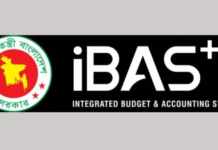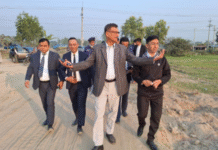
Tens of thousands of people are spilling into Shahbagh on the International Mother Language Day to attend a pre-announced rally there demanding death penalty for all convicted war criminals and a ban on the politics of Jamaat-e-Islami.
People from across the broad social spectrum started converging in droves in the heart of the civil uprising since morning after paying respects to those gallant souls who had laid down their lives on Feb 21, 1952 to secure the right to speak in their mother tongue Bengali.
All those attending the rally have a single determination – to build a ‘Razakar-free Bangladesh’.
The rally kicked off at 3pm although the main programme began an hour later with recitation from the Qur’an on the 17th day of the mass uprising that began with the second war crimes tribunal of Bangladesh sentencing Jamaat leader Abdul Quader Moll to life in prison for crimes against humanity during the War of Liberation in 1971. Thousands of people, mostly youths, hit the streets across Bangladesh demanding capital punishment for all convicted war criminals.
Maulana Mehedi Hasan recited from the Qur’an, Sadhan Chakrabarty from the Geeta, Prof Biman Barua from the Tripitak and Michael H Shah from the Bible.
Hundreds of thousands of protesters stood up and sang the national anthem in chorus at 4:25pm. At 4:30pm they sang the immortal song, ‘Amar Bhaier Rokte Rangano Ekushey February, Ami Ki Bhulite Pari’ in memory of the martyrs of the Language Movement.
Fresh demonstration plans are expected to come from the rally.
The unprecedented movement that began on Feb 5 at the Shahbagh intersection, now known as the Prajanma Chattar, has spread across Bangladesh. Hundreds of thousands of people across the country are also demonstrating over the same demands.
Four decades on, the War of Independence whips up strong emotions. Although Bangladesh achieved independence from Pakistan through a nine-month long bloody war, the nation still carries the wounds of the war. As many as three million people were killed and more than quarter of a million of women were dishonoured.
In its two verdicts, the International Crimes Tribunal-2, set up to expedite the ongoing war crimes trials, observed and elaborated how the Jamaat and its student front, known as the Islami Chhatra Sangha then, had supported the Pakistan army in carrying out the atrocities. The top brass of the radical party is currently standing trial on a raft of war crimes charges.
As the demonstration at Shahbagh continued, several ministers and MPs expressed solidarity with them. The government amended the Act under which the war crimes trials were being conducted with provision giving equal rights of appeal to the prosecution and the defence against a verdict.
Another part of the amendment allows the government to try parties or organisations on war crimes charges. This means, the government can now try Jamaat. The radical party had substantially contributed in forming auxiliary forces to assist the Pakistan army and tried to thwart the nation’s struggle for freedom.
The Jamaat is a key ally of the BNP and even two of its leaders, currently standing trials, had served as ministers during 2001-6 Khaleda Zia-administration.
The party had been opposing the trials from the very beginning and alleged the Sheikh Hasina government of carrying out a political vendetta against them. Trying the war criminals was one of the electoral pledges of the Awami League-led coalition government.
BNP chief Khaleda Zia has termed the trials a ‘farce’.
Source: bdnews24









